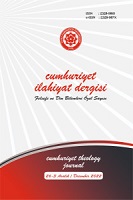Şehrezûrî Düşüncesinde Nefsin Kuvvelerinin Ahlâkî Tekâmüle Tesiri
The Effects of the Powers of the Nafs on Moral Perfection in the Thought of al-Shahrazūrī
Author(s): Asiye AykıtSubject(s): Metaphysics, Ethics / Practical Philosophy, Islam studies, Middle-East Philosophy, Philosophy of Religion
Published by: Cumhuriyet Üniversitesi İlahyat Fakültesi
Keywords: Islamic Philosophy; Morality; Perfection; Nafs; Power; al-Shahrazūrī;
Summary/Abstract: The issue of reaching moral perfection in Islamic thought is handled together with the theory of knowledge. The subject of soul (nafs) and powers, which includes the physical and metaphysical aspects of human being, forms the basis of the theory of knowledge and morality based on it. The aim of this article is to examine the views of Shams al-Din al- al-Shahrazūrī (d. 687/1288), one of the most important names of the Ishrāqī school(Illuminationist thought), about the soul and its powers at the center of the idea of moral evolution. In the author's system about powers, the animal soul realizes perception and movement based on the senses. This realization, which takes place at a minor level, enables humans and animals to maintain their daily lives. In order for an action to have moral value, such partial knowledge must reach the level of universal knowledge by the nātiq soul. The theory of imagination and memory, which is examined within the inner cognitive powers of the animal power, is also at the focus of the criticism of the Ishrāqī thought to the Peripatetic understanding of knowledge. In our study, on the one hand, alShahrazūrī’s theory of powers and the idea of moral evolution are examined; on the other hand, criticisms of the Peripatetic school are also discussed on these issues. Thus, another aim of our study is to examine, al-Shahrazūrī’s understanding of morality in the context of his contributions to Ishrāqī thought, similarities and differences with Peripatetic philosophy. Al-Shahrazūrī follows his teacher al-Suhrawardī in his theory of knowledge and thought of perfection, which he explains in connection with the powers of the soul. However, he made his teacher's thoughts more systematic on the subject of powers and enriched them with different examples. The interlocutor of both authors in terms of powers is Avicenna who is the founder of the system in this field in Islamic thought. The most detailed explanation about the division of the inner powers of perception by five in the form of common sense, imagination, delusion, imagination and memory belongs to Avicenna. Al-Fārābī’s division for these powers is similar to that of al-Shahrazūrī. Although al-Shahrazūrī clearly mentions the Peripatetic school in his explanations and criticisms, it is determined that his addressee is Avicenna. As was the case in al-Suhrawardī, al-Shahrazūrī who first discussed and explained the five-point classification according to the Avicennan system, then criticizes this system and bases on three basic powers as common sense, imagination and zākira (memory). He places these powers at the base of his moral philosophy in harmony with his own ontology and epistemology. The most basic criticism of Avicenna about powers is on the function of imagination and memory to store images and meanings. AlShahrazūrī does not accept the function of both powers in the sense of storing power, but combines the functions of these senses in imagination. Al-Shahrazūrī's criticisms of Avicenna's classification on powers are mainly directed towards his theory of knowledge and form the basis for explaining his own Ishrāqī theory of knowledge. The reason why he reduces the inner senses to three basic powers and shows different actions as functions of a single force is basically denying the existence of powers that store images or judgments within the powers of the soul. This attitude, which we see in al-Suhrawardī, allows to explain the Ishrâqî theory of knowledge. According to Avicenna, since cognition is the formation of the forms of sensible objects in the mind, these forms must be preserved in the mind when they disappear. However, for al-Suhrawardī, cognition takes place in luminous realms depending on the relation between the subject and the truths of sensory objects. The truths of these objects took place in the ‘âlam al-mithal (imaginal world). In this case, there is no need for a bodily force to reserve this kind of knowledge. Such a theory of knowledge also deeply influences the idea of moral evolution. What is essential for human beings in perfection is to lead a life oriented towards luminous realms where knowledge will be realized. This attitude places the idea of isolation, which is based on asceticism and contemplation, at the center of moral evolution. In the process of knowledge required for competence, the inferential experience is important, but in the last stage, the main thing should be the experience of pleasure. Al-Shahrazūrī describes a person who has achieved moral competence at the highest level as " ārif (sage)". Ārif is a person who attains the knowledge of the realm of light by fulfilling asceticism and contemplation in the most perfect manner, and is at the peak of moral competence. In al-Shahrazūrī's thought, the sage should use the methods of reasoning, however, in the last stage, he should deepen in the methods of asceticism and observation and emphasize intuitive knowledge. In these thoughts, al-Shahrazūrī is based on the Ishrāqī method by synthesizing the Peripatetic method, which emphasizes the mental experience, and the Sufi method, which emphasizes the experience of pleasure. Al-Shahrazūrī, who followed Suhrawardī in this regard, made his teacher's thoughts more systematic on the subject of powers and strengthened them with different examples. With this attitude, he deepened the mystical character of Ishrāqī philosophy within the framework of the idea of moral evolution.
Journal: Cumhuriyet İlahiyat Dergisi
- Issue Year: 26/2022
- Issue No: 3
- Page Range: 1161-1179
- Page Count: 19
- Language: Turkish

